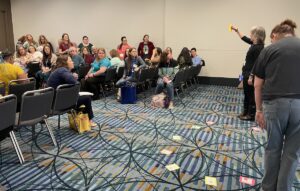Auditory Processing and Big-Body Play
It is happening more and more frequently: I am standing right next to a child and saying his name repeatedly, but he is looking elsewhere and doesn’t “hear” me. I turn to his teachers and ask, “Can he hear?” To which the answer is, yes. I say his name again with no response from my little friend, so I ask his teachers, “Does he know his name?” Again, the answer is yes.
Is this happening to you?
If so, consider the physicality this child participates in, his home life, and his general activity level. All of this can have an enormous impact on his ability to process what he hears.
What do I mean?
Sedentary children are typically upright and still. I think we can all agree on that. But we need our heads and eyes to move, a lot, in a lot of different planes and directions to stimulate our vestibular function. The vestibular system is in charge of several classroom necessities, one of which is processing the information we are bombarded with all day long.
What do I mean?
Imagine you are sitting at your desk, you can tune out the cacophony of data that your ears are taking in: the HVAC turning on and off, your coworker on the phone at their desk, the phone ringing at reception, the conversation at the water cooler, etc. But imagine all of this coming into your brain at the same level. It would be overwhelming. This is what it is like for a child with a poorly developed vestibular system. He cannot filter important information (his teacher saying his name) from unimportant information (the sound of his friends playing).
Wait, what?
Crazy, I know, but our physicality plays a very important role in our “hearing” and children today don’t move enough, so their ability to process sound is not what it should be.
What do I mean?
First, the vestibular system gains its information from what is happening in the inner ear. This complicated system sends signals to our brain about where we are in space, gathered from the movement of fluid across tiny hairs in the semicircular canals of our ears. Those signals are essential for maintaining balance. At the same time, the inner ear is processing movement, it is also processing sound. Studies have found a link between these two functions. More often than not children with vestibular dysfunction also have auditory processing dysfunction.
When children are challenged with auditory processing, then their ability to discriminate between important foreground sounds and unimportant background noise is diminished. This shortcoming compromises their ability to understand language and ultimately to use words in a meaningful way. So language success as well as the ability to follow directions become challenged with a poorly developed vestibular system because of problems with processing auditory information.
The vestibular system also supports our arousal state through the Reticular Activating System (RAS), a nerve network connecting the spinal cord, cerebellum, and brain stem. The RAS filters necessary information from unnecessary information and ultimately determines how conscious, responsive, and alert we are.
So when our brains must tackle the information we are hammered with all day long, our vestibular system manages that information by deciphering volumes of incoming sensory data. When that decoding happens, the vestibular system assists our attention system as we learn to regulate the onslaught of information. If the system gets overwhelmed, tired, or doesn’t work properly because it isn’t well developed, it can shut down which can come across as being “spaced out, appear to be inattention, or even come across as a child who can’t hear.
And this is going to happen when kids spend too much time in sedentary activities.
Crazy, but true. Children must move their heads and eyes in multiple planes and directions in order to stimulate and strengthen their vestibular systems.
Interestingly, this is movement that children typically crave. But in our culture today, both in and out of school, children spend more time in upright and still positions than they do in the big-body physical play of generations past.
But the truth is, a successful classroom experience starts with the ability to pay attention and process what we hear. But if we are truly going to help children build the foundation they need for long-term learning, we have to get them moving, a lot, to help their brains and bodies work together as they were designed to do.
The brain can’t do it alone.
Vestibule” means entryway. The vestibular system is the entryway to the brain making it the control center for all learning, executive function and self control.
A successful classroom experience starts with the ability to pay attention, control behavior and control the body.
And this is all built off a well-developed vestibular system.

Strong Bodies, Strong Brains
Are you ready to Outsmart the Wiggles?

Posters!
The power of visuals is undeniable. Help the adults in your students’ world wrap their heads around the importance of big-body physical play for their social, emotional, behavioral, and academic journey! Our posters are designed to start conversations on the Power of Play to Outsmart the Wiggles. Get yours here.

Movement Helps Kids Sit Still
What can you do during the school day to help your students get active? How can you be sure you are doing enough? This workbook and audit will help you hone in on where the weaknesses lie (and with whom) and how to analyze and then leverage your schedule to fold in more activity. With a short video, ideas to get kids moving in the classroom as well as a lesson plan with 6 games, you can hit the ground running to success immediately! Learn more or get yours here.

Professional Development, Training, Consulting
As an international presenter, Preston has presented to rave reviews for more than a dozen years. Her engaging presentation style combined with mind-blowing data and facts, practical application and humor leave attendees empowered and inspired.
Ready to be part of the fuel that fires the power of play? Get on our calendar: Smartfun@pivotoplay.com
